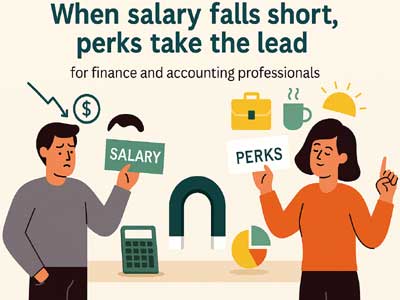New research from international recruitment firm Robert Half reveals a shift in compensation expectations among finance and accounting professionals. Once a nice-to-have, perks and benefits have now become the make-or-break factor for workers in that field.
According to the 2026 Salary Guide, just two per cent of finance and accounting professionals said they would not consider alternatives to a pay rise. The remaining majority are open to a range of non-salary incentives that reflect the changing priorities in the workplace. Once driven by salary negotiations, finance professionals are now weighing the full package, from hybrid working and remote options to professional development, before making their next move.
Top alternatives to salary increases include, 86 per cent would accept an annual performance bonus, 82 per cent would value more paid time off, 80 per cent seek flexible work arrangements, 68 per cent are interested in professional development opportunities and upskilling, 67 per cent would consider a one-time signing bonus, 63 per cent value insurance programmes and, 63 per cent are open to stock options.
Phil Boden, an expert, comments, “The data clearly shows that finance and accounting professionals are redefining what competitive compensation looks like. While salary remains important, it’s no longer the sole driver of career decisions. Today’s professionals are placing increasing value on benefits that support their well-being, work-life balance and long-term career growth.
Employers who want to attract and retain top talent in this space must think beyond pay rises, and in fact, many are already resorting to such alternatives to attract and retain employees while navigating the current macroeconomic environment with stretched budgets. Offering annual performance bonuses, additional paid time off, and flexible work arrangements are not just perks; they’re strategic tools that reflect a deeper understanding of what motivates the modern workforce.
“What’s particularly striking is the openness to alternatives that these professionals have demonstrated. Only two per cent of workers said no perk or benefit could compensate for a pay rise. That tells us that the vast majority are willing to engage in a broader conversation about value, one that includes professional development, insurance programmes and even stock options,” he adds.
“In a competitive hiring landscape, organisations that embrace a holistic approach to compensation that aligns with both personal and professional priorities will be better positioned to secure and retain the talent they need to thrive,” Boden concludes.














Related Items
Global careers are leaving young professionals emotionally isolated
Amna earns prestigious recognition for her research paper
GIAN course on Advanced Plant Hormone Research inaugurated